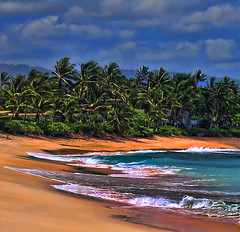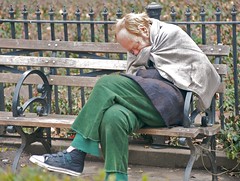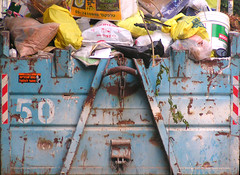Is it possible? Can you really travel for free? The short answer is "yes". The long answer adds "... if you're a masochist with an extreme tolerance for adventure." Some initial expenditures can go a long way to making life easier for you. I'm not going to pull punches, though; it's often a hard, painful experience. Obviously, this one is for people who aren't planning on leaving permanently. Some people think of it as being a "nomad" or a "vagabond", but the word "homeless" isn't too far from the truth.
Homeless
 |
| Paradise still sucks when you're homeless Photo by Scott Hudson |
When people find out I where I was homeless, they often say "oh my God, but you were in Hawaii!" My response: "try it."
Until you've been homeless, you have no idea how hard it really is. You can't keep clean, you can't "hide" being homeless and no one wants to look at homeless people, much less talk to them. Your only other friends tend to be homeless people and from my experience, they're a sad lot indeed — though some of them have amazing stories of how they happened to get there.
So what does this have to do with living/travelling in another country? I've a friend who bought a ticket to the UK several years ago and "missed" the return flight home. He squatted in London, hitchhiked across France, got beaten up and had his backpack stolen in Paris and the police weren't interested in helping a homeless American bum. Still, people have dreams of hitch-hiking across Europe and they sometimes think of the Travellers or Gypsies with an air of romanticism due to their nomadic lifestyles. Hitchhiking across South America can be a wonderful experience (I've a friend who did it for a few months), but there's a good chance you'll be sleeping rough, longing for a shower and discovering that the police don't care much what happens to bums.
It might sound like an adventure, but honestly, many "adventures" are only adventures after the fact — though these are often the most memorable adventures of all.
Understanding the Nomad Lifestyle
 |
| The reality of being a "nomad" Photo by Ed Yourdon |
In other words, if you go this route and have to fly to your first destination, by a round trip ticket and have a place to stay during that time. This doesn't mean you'll be flying back on your return ticket (and honestly, they're very unlikely to notice at first), but you need to look normal (side note: the round trip tickets are often cheaper than one way tickets). You can also check out an "open return" ticket. You'll need to contact your airline for this. They're much more expensive, but they allow you to change your return date without cost. Very handy if you don't know how long you'll be gone!
If you're homeless while travelling, you might very well find yourself in a very dire situation. However, if you're completely destitute and you're an American, even though the US State Department doesn't mention this directly in their "financial emergencies" FAQ, they can loan you money to get home, but you'll not be able to use your passport again until you repay the loan.
Shelter, Food, and Travel
Next you'll need to figure out where you're going to do this. This is tricky because the richer the country, the better the pickings for you if you go dumpster diving. The poorer the country, the further your limited supply of money will get you.
First you need to decide if you're going to be sleeping rough (outside) or trying to find free/cheap places to stay. I would advise extreme caution about sleeping rough, particularly if you're female. I made it work in Hawaii by hiking a couple of miles outside of town almost every night. On the nights I was too tired to leave town, I was far more likely to get hassled by police and once I found myself fleeing a man who exposed himself to me and decided to give chase when I ran (fortunately, I escaped). If you go this route, try not to do it alone (though I can tell you that this can stress a friendship more than anything you can imagine).
If you don't care for sleeping outside, you can check out couchsurfing.com to try and get free places to stay, but I've heard people saying it's a very hit or miss experience. You can also read this detailed review of couchsurfing.com and alternatives. Basically, there are people all over the planet willing to give you a free place to stay because they're looking to meet new and interesting people. This can be a great thing, but if you can't see any potential downside here, you're probably a wee bit too trusting.
 |
| Dinner is served Photo by Tal Bright |
Also, to get both food and shelter, check out WWOOF (World Wide Opportunities on Organic Farms). Created in the 1970s, WWOOF is a world-wide network of organic farms who offer volunteers food and shelter in exchange for help on the farm. As usual, Wikipedia provides a useful summary of WWOOF.
After several luxurious days of sleeping in a park and dining on stale bread, you're probably ready to move on. Your feet are the most reliable sources of travel. A bike is nice, but you have to carry supplies to repair it and there's the constant worry of theft. Another think to consider it hitchhiking (again, I didn't say this would be easy! Learning to hitchhike is harder than you think. You're not going to have much success in the center of town and if you look like a scruffy, homeless bum, that's not going to help either.
Here are some basics for hitchhiking:
- Look clean and friendly (smile!)
- Make eye contact with drivers
- Try roads leading out of town
- Don't get in a car if you feel uncomfortable
- Ask people at rest areas, traffic lights and gas stations
Planning
This might sound stupid, but you can train for this. You'll be walking a lot, so pack everything you plan to take with you into a bag and walk with that. I read a book about a man who walked around the world, but in all of his training he forgot to carry a full pack and quickly had to discard most of it. Don't do that! Go for hikes with that full pack and make sure you know what you're getting into. Try spending a couple of weekends alone in a local environment similar to what you're expecting and see if you can survive. Remember: take no money. Try dumpster diving in a "safe" environment first.
At the very least, you'll need:
- A bedroll
- Container for water
- First aid kit (and any med supplies you might need)
- A change of clothes
- Rain poncho
- Spoon, fork, knife, plate, cup, bowl
- Emergency contact information
- Pocket atlas (since you'll be travelling a lot)
You'll probably want a lot more than that, but how much can you carry? Particularly if you haven't eaten for a while? Also, buy the best, most rugged gear you can afford for all of that. If you bought a cheap rucksack and it's falling apart a month into your trip you're going to be pretty unhappy. And if you bring a watch, make it a wind-up or put in a fresh battery before you go.
Should you do this?
For most people, I would say "absolutely not". You honestly cannot imagine how hard this is unless you're actually doing it. By then, it's too late. However, if you have to get out and see the world and you have no money or skills, you can still make it happen. You just have to do it the hard way.
Interesting stuff. I would say that in a lot of the UK and Europe, squatting is a viable and legal option (viability varies by region, more than legality; there are towns where it's legal to squat, but where the police will throw you out illegally as soon as they find you're doing it). In the UK, the Advisory Service for Squatters has great info, as well as practical, let's-find-a-squat-tonight evenings:
ReplyDeletehttp://www.squatter.org.uk/
London, at least, has a lot of young-ish squatters from all over the world, so it wouldn't be a bad starting point for squat-enabled nomadism -- hit London just before a practical squat evening, find a place to live, talk to other squatters about doing the same in other parts of Europe...
@Ian: how legal is it for foreigners though?
ReplyDeleteNotebooks...
ReplyDeleteCheck out the Geocaching shops
(see geocaching.com for links)
These often sell notebooks with waterproof paper.
(Theu're not just used for reasureboxes, but also by birdwatchers, trainspotters and others of us who doesn't have a life. Even pro photographers sometimes use them for notes )
Tents.
My Fjellraven tent is 1.5Kg without the rods, 2.2Kg with, and can be easily put up even in a full storm. (It was bl**dy expensive, though)
The bottom is rated 10.000mmm 'watercolumn' and the top 4.000, so you can basically camp under a waterfall and remain dry.
In Norway it's legal to camp in 'unfenced land'(that's what the dictionary suggested for translation; basically land not actively maintained) that's at least 150meters from permanent homes, don't stay at the spot for more than 3 days and don't damage anything or leave garbage behind.
(This law goes back to the viking ages... )
It's also legal to fish in the sea all year round(with some exceptions, mostly around river outlets), and pick berries and mushrooms in the forests. (Doesn't matter if someone owns the land, unless they're cultivating it, it's free to be picked.) Fishing in freshwater or hunting can be costly, though.
http://www.dirnat.no/content.ap?thisId=1620
This kind of stuff may be useful to know about any country you plan to visit...
Another way to see the world is by boat.
A friend of mine quit his job(photographer) back in the 90s, sold off everything and got himself a 28' sailboat. Then he cruised up and down the coast of norway for a few years, sailing in the summer, finding work in the winter.
A few years ago he set off on the 'grand voyage', from Norway to Denmark, to France and so on, then set off across the Atlantic...
(Where his boat was rammed and sunk by a freighter. Shit happens. Got a new boat, keeps on sailing.)
He's on an island 'St. Lucia' now.
He's even managed to get married.
His public travel log can be found at http://shiptrak.org/?callsign=la7qz&filter=30
(Select 'All' instead of 'Last 30 days' if you have nothing much to do the rest of the day... )
boat living is the best your friend has the right idea
ReplyDelete